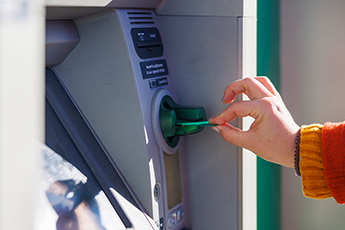Ever had a conversation with a friend in the presence of your phone, only to begin receiving digital ads for the very thing you were discussing shortly afterward? The occurrence is so common that 55% of Americans believe their smartphones are spying on them in order to send custom advertisements. While major technology providers insist that they are not listening in on people’s conversations, our mobile phones, computers, and even smart speakers track the things we ask about, search for, and purchase online and use that information to tailor digital ads to each of us. Much in the way that smartphones have become a part of our everyday lives and are able to process amazing amounts of information, industry experts believe that contracts are headed in the same direction. In fact, PwC predicts that it won’t be long before smart contracts become the norm within the banking industry and completely replace traditional contracts. Leveling Up A smart contract is essentially a contract with software built in that will automatically run and trigger the execution of an agreement once any predetermined requirements included within it have been met. Such contracts run a blockchain, which is essentially a shared digital ledger that stores transaction info in a series of “blocks” that can’t be altered or tampered with, once the step is complete, eventually creating a “chain” of such immutable records. Smart contracts. provide complete transparency for all parties involved, making them lower risk and eliminating the need for the level of oversight and interpretation involved with traditional contracts. Smart contracts also promise cost savings for organizations. Since everything involved with a smart contract is transparent and verifiable through the blockchain — which is impossible to alter or tamper with since the algorithm is digitally shared with countless parties — they eliminate the need for intermediaries such as lawyers and brokers. In light of such benefits, smart contracts are expected to replace traditional contracts outright. According to a recent study by PwC, 52% of the people in charge of IT within the financial industry have plans to begin using smart contracts in the near future, with more than a third of this group anticipating that they will ultimately take the place of conventional financial transactions. PwC found that 95% of IT decision-makers have confidence in the security, transparency, and reliability of smart contracts. In fact, 84% view them as a way to enhance sales, 74% see them as a way to assist with sustainability initiatives, and 53% view them as a way to save money. Benefits of Smart ContractsHere are five benefits attracting financial institutions to smart contracts:
- Automation. Smart contracts have the ability to be programmed to prompt automated actions based on predetermined requirements in a variety of areas within banking. Options range from payments and lending to trade finance, compliance, and insurance.
- Reduced costs. This is primarily based on the ability to eliminate intermediaries such as lawyers and brokers.
- Security and transparency. Given that blockchain is decentralized and utilizes cryptography, these contracts are quite safe and have built-in safeguards against fraud. The inherent transparency also lends additional security.
- Quicker fund access. Instead of a long settlement period because of manual processes and intermediaries, smart contracts settle almost immediately, which grants faster access to funds and liquidity enhancement.
- Accessibility. Smart contracts can be used from anywhere in the world on a 24/7 basis, so they are far more accessible to customers who don’t have access to a brick-and-mortar branch.
Early Adoption Smart contracts have already begun to see adoption within the banking industry, largely in the form of peer-to-peer (P2P) payments and the digitization of transactions. Citibank recently announced that its Citi Treasury and Trade Solutions has launched a pilot program that uses blockchain and smart contracts to provide digital asset offerings for its institutional clients. Citi’s program will include cross-border payments and automated trade finance solutions, along with instant payments to service providers and the ability to transfer assets between Citi’s branches. Other financial institutions that are testing smart contracts to automate the recording of ownership change and payment processes include Barclays, Bank of America, Standard Chartered, and the Development Bank of Singapore.Barriers to adoptionDespite the benefits that smart contracts promise, they are not without their challenges. According to PwC, just 19% of service providers are using smart contracts, due largely to a lack of the expertise needed to put them in place and integrate them within businesses’ existing processes. Given the importance of ensuring that the code required to put smart contracts into place is correct, it is critical to be sure that the people writing such code are experts. In many cases, smart contracts are also reliant on external data sources, opening organizations to the risk of unreliable data or the potential for fraudulent manipulation. Other factors keeping organizations from adopting the technology include:
- Human error. Blockchain technology is unchangeable if executed properly. If there are errors in the code that deploys the contracts, however, then security breaches can become a real threat.
- Compliance issues. The inflexible nature of smart contracts could create regulatory compliance problems if regulations change after contracts are put into place.
- Amending contracts. The immutable nature of smart contracts means that fixing bugs, making improvements, or terminating existing contracts would be extremely difficult.
- Limited network bandwidth. Widespread use of smart contracts across multiple organizations could potentially overtax the blockchain network.
Given the countless benefits and efficiencies that smart contracts promise, there is little doubt that their incorporation within the banking industry will pick up speed and that many more financial institutions will soon follow the lead of Citibank and other early adopters. But until some of the uncertainties surrounding them are worked out, community financial institutions should be sure to do their homework before dipping a toe into the use of smart contracts.




